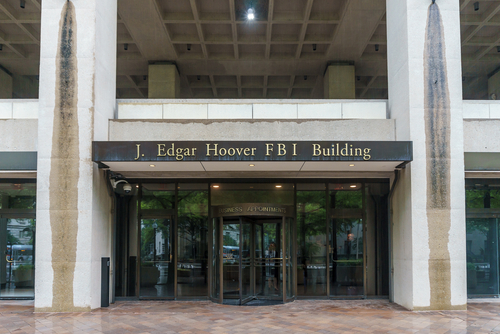
Top U.S. officials testified on Wednesday during a U.S. House committee hearing that the FBI, Department of Homeland Security (DHS) and Department of Justice (DOJ) are focused on countering a rise in domestic terrorism threats.
U.S. Rep. Bennie Thompson (D-MS), chairman of the House Homeland Security Committee, said in the last two years, there have been more domestic terrorism-related arrests than international-terrorism-related arrests. “Last year, nearly all extremism-related murders in the United States were committed by right-wing domestic terrorists,” Thompson said during opening remarks.
Among the recent incidents cited by Thompson were: the attack against Jewish worshipers at a synagogue near San Diego; the February arrest of a former Coast Guard lieutenant who was stockpiling weapons and drugs and planning attacks targeting prominent Democratic politicians; last October’s mass shooting of Jewish worshipers at a Pittsburgh synagogue; and the mailing of pipe bombs to Democratic politicians in the same month.
Representatives of the FBI, DHS and DOJ, told lawmakers that threats from and incidents involving domestic terrorism are increasing.
“We believe domestic terrorists pose a present and persistent threat of violence and economic harm to the United States; in fact, there have been more arrests and deaths caused by domestic terrorists than international terrorists in recent years,” Michael McGarrity, assistant director of the FBI’s counterterrorism division, told the committee. “We are most concerned about lone offenders, primarily using firearms, as these lone offenders represent the dominant trend for lethal domestic terrorists. Frequently, these individuals act without a clear group affiliation or guidance, making them challenging to identify, investigate, and disrupt.”
Brian Murphy, principal deputy under secretary for Intelligence and Analysis for DHS, said the department is focusing more on reporting on domestic terrorism to better support the National Strategy for Counterterrorism. “Specifically, we have significantly increased our open source collection against domestic violent extremist groups. We have also been working with our partners in the FBI to provide context on the domestic terrorism threat with particular attention to tactics and techniques domestic violent extremists utilize to conduct their attacks. For example, in the wake of the horrific shootings in San Diego we supported the DHS Office for Civil Rights/Civil Liberties on an unclassified conference call with members of the faith-based community nationwide to provide them information and context on the threats to religious facilities and best practices for securing their facilities.”
Brad Wiegmann, deputy assistant attorney general in the National Security Division at DOJ, told the committee though authorities conduct surveillance on domestic groups, it is difficult to proceed in many cases because of the First Amendment protection on free speech, which differentiates acts of violence and threats of violence from speech.
FBI’s McGarrity said the agency has 850 open domestic terrorism cases, about 50 percent of which are anti-government protests and 40 percent of which are related to white supremacy or racism of some kind.
McGarrity said the FBI and the other agencies are working closely with social media companies to share tips of potential terrorism cases and training those companies on how to identify threats. “We certainly educate people to the threat, whether they are a social media company, a bank or a shipping company,” he said. DHS’s Murphy said his agency is working with social media companies “to get them to police themselves.”
McGarrity said the FBI has yet to see any cyberthreat from domestic terrorists.
While the U.S. government has labelled several international organizations as terrorist groups, which make them liable for financial and other sanctions, the label has not been used for any domestic groups, said McGarrity.
When asked by U.S. Rep. Kathleen Rice (D-NY) what the agencies are doing to combat the threat of armed militias, McGarrity said the threat of armed militias has appeared to have declined over the last few years because of a few high-profile prosecutions. He said the government cannot act against these groups unless there is a direction towards violence by the groups.
McGarrity responded to a question by U.S. Rep. Dina Titus (D-NV) about whether the FBI is monitoring antiabortion groups and potential threats to abortion clinics, by repeating his assertion the FBI can only act if there is violence or a threat of violence. “If you’re pushing violence to pursue your ideology then we’re looking to investigate you,” he said.
Rice raised the emergence of a group of men affected by the Incel movement, for involuntary celibacy, a group who is prone to violence against women. Several suspects in potential acts of mass violence, including a Colorado man who threatened mass murder of women, have been connected to this movement, according to several committee members.
Two Democrat committee members urged DOJ to release an internal document purporting to target African-Americans protesting law enforcement violence. “I urge whoever has the race paper to release it in its entirety,” said U.S. Rep. Barbara Jackson-Lee (D-TX).




